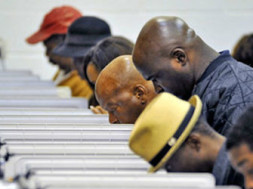
Symbols, Statues, and Substance
By Dr. Julianne Malveaux – Socially isolated and alone in my home, I lifted my fist into the air when I learned that the Mississippi legislature voted to remove the Confederate stars and bars from their flag. As NACCP President Derrick Jackson said, “it’s been a long time coming.” A long time since the songstress Nina Simone put it out there with Mississippi G—damn. A long time since Emmitt Till was massacred for “reckless eyeballing.” A long time since James Chaney, Andrew Goodman, and Michael Schwerner were murdered. It’s been a long time coming, but has Mississippi changed?
I’m an economist, so I have to go with the data. Mississippi is the most impoverished state in our nation. It also has the highest percentage of African Americans – 37 percent. Still, the state voted in a racist white woman – Cindy Hyde-Smith, who joked about lynching in the days leading up to her election. Mississippians found such jokes acceptable since they rejected Mike Espey’s candidacy for the Mississippi Senate seat that Hyde-Smith now occupies. He garnered 46 percent of the vote in what was described as the closest Senate election in Mississippi since 1988, still, his defeat speaks to the intransigence of racism in his state. Perhaps his 2020 candidacy will yield different results. From my perspective, though, it’s not the symbolic flag, but also the substantive racial inequality in Mississippi.
So while I also cheered that the Princeton University Board of trustees finally agreed to remove the nation’s racist 28th President’s name from its public policy school, I wonder if anything else has changed at Princeton. Students have demanded a more diversified faculty and curriculum and funding for research on reparation. The name change is the first step. What is the next step?
In Virginia, Governor Ralph Northam (D) said he would remove the statue of Jefferson Davis, the traitorous President of the Confederacy from Richmond’s Monument Avenue. As soon as he announced it, there was a lawsuit challenging his decision, and the matter is headed for court. Rita Davis, the Black woman who is Northam’s legal advisor, said the statue was designed to minimize “a devastating evil.” If you walk down Monument Avenue, evil abounds. Taking the statue down is a first step for the blackface-wearing governor, but again what’s next?
Even as the winds of change are swirling, there are dinosaurs who cling tenaciously to our nation’s racist past. I do not understand why Confederate loyalists seem to have forgotten that THE CONFEDERACY LOST THE CIVIL WAR. Except to stir up his racist base, I don’t understand why a man who was born and raised in New York has such loyalty to the Confederacy.
On June 26, the 45th President issued an executive order “protecting monuments, memorials, and statues and combatting recent criminal violence.” The executive order is replete with combative and incendiary language, describing protesters as “rioters, arsonists, and left-wing extremists.” It uses terms like “Marxism” and “agitator” to describe those who oppose historic racism as “ignorant of history.” Because of this “ignorance” (look in the mirror, Mr. Prsident), the executive order says the Feds will prosecute people who “destroys, damages or desecrates a monument on federal or state property,” and their “accomplices” and imposes criminal penalties of up to 10 years in jail. Really? If our nation’s founders had been held to the same specious standards, there would be no United States of America.
The folks who are clinging to statues are clinging to a way of life where Black people are supposed to bow and scrape and accept any kind of treatment from “powerful” white people. In adhering to the Confederacy and folks like Woodrow Wilson and Andrew Jackson, they are clinging to Presidents who were oppressive segregationists. Wilson’s legacy is especially egregious as he deliberately attempted to reverse Black progress by resegregating the civil service. Now, we have a President who would do it all again by embracing racism, retweeting a “white power” video, demonizing protesters, and using language designed to divide.
Some of the symbols of racism are being erased, albeit slowly, but little has changed about the substance of racial inequality. People should not be celebrating symbolic victories unless they are prepared to challenge structural inequality. I cringe when I walk in downtown DC, looking at signs that proclaim “Black Lives Matter,” knowing that many of these stores have exhibited racist behavior toward Black neighbors. Don’t eradicate the symbol, Mississippi, Princeton, commercial establishments, if you aren’t also willing to eliminate the substance of racial inequality.
Dr. Julianne Malveaux is an author and economist who can be reached at www.juliannemalveaux.com







